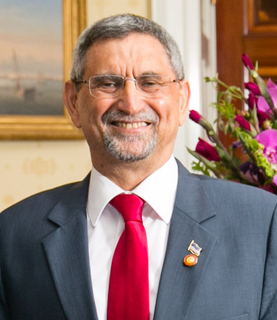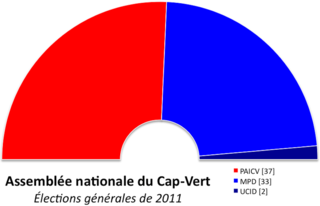| |||||||||||||||||
| Registered | 260,209 | ||||||||||||||||
|---|---|---|---|---|---|---|---|---|---|---|---|---|---|---|---|---|---|
| Turnout | 59.0% | ||||||||||||||||
| |||||||||||||||||
| |||||||||||||||||
 |
|---|
| This article is part of a series on the politics and government of Cape Verde |
Legislature |
Judiciary |
Presidential elections were held in Cape Verde on 11 February 2001, with a second round on 25 February after no candidate achieved outright victory in the first round. The result was a victory for Pedro Pires of the African Party for the Independence of Cape Verde, who defeated Carlos Veiga of the Movement for Democracy by just twelve votes. [1] Pires, a former Prime Minister, took office on 22 March 2001, replacing António Mascarenhas Monteiro, who stood down after completing two terms in office.

Cape Verde or Cabo Verde, officially the Republic of Cabo Verde, is an island country spanning an archipelago of 10 volcanic islands in the central Atlantic Ocean. It forms part of the Macaronesia ecoregion, along with the Azores, Canary Islands, Madeira, and the Savage Isles. In ancient times these islands were referred to as "the Islands of the Blessed" or the "Fortunate Isles". Located 570 kilometres (350 mi) west of the Cape Verde Peninsula off the coast of Northwest Africa, the islands cover a combined area of slightly over 4,000 square kilometres (1,500 sq mi).

Pedro de Verona Rodrigues Pires was the President of Cape Verde from March 2001 to September 2011. Before becoming President, he was Prime Minister from 1975 to 1991.

The African Party of Independence of Cape Verde is a former socialist party and currently a social-democratic political party in Cape Verde. Its members are nicknamed "os tambarinas" in Portuguese, and they identify themselves with the color yellow.









